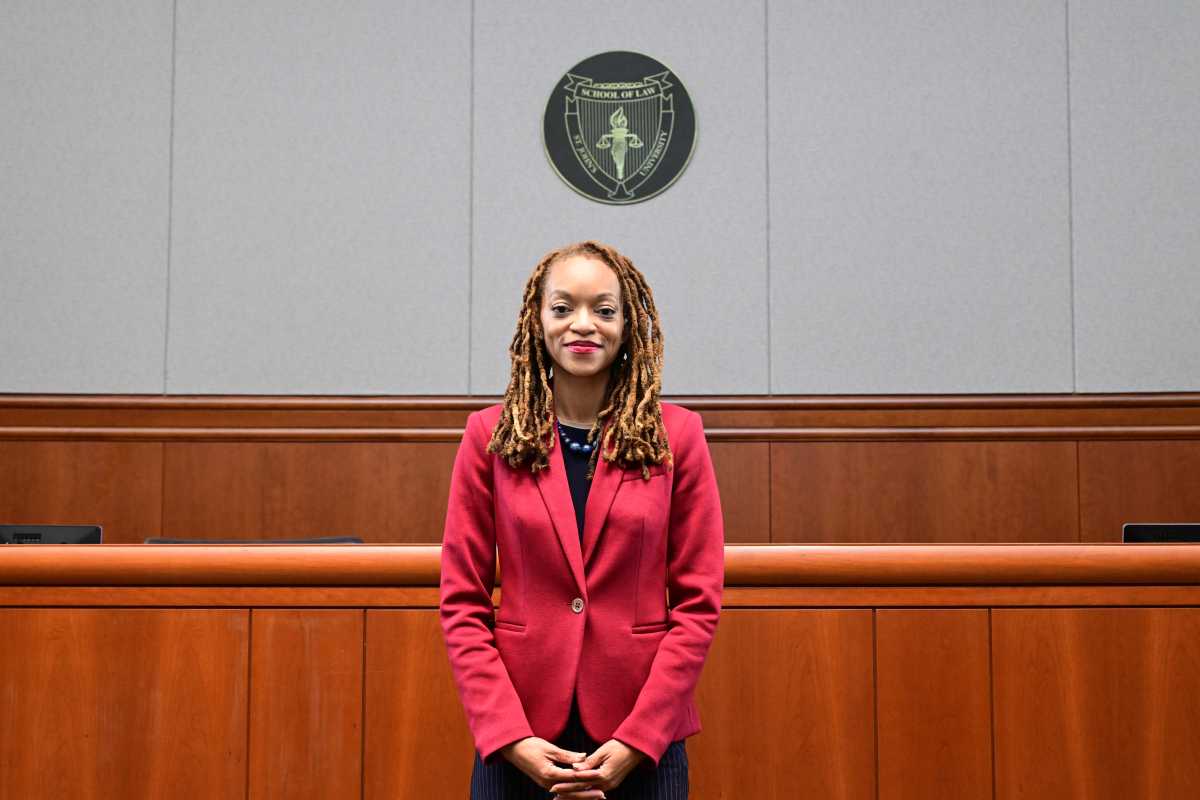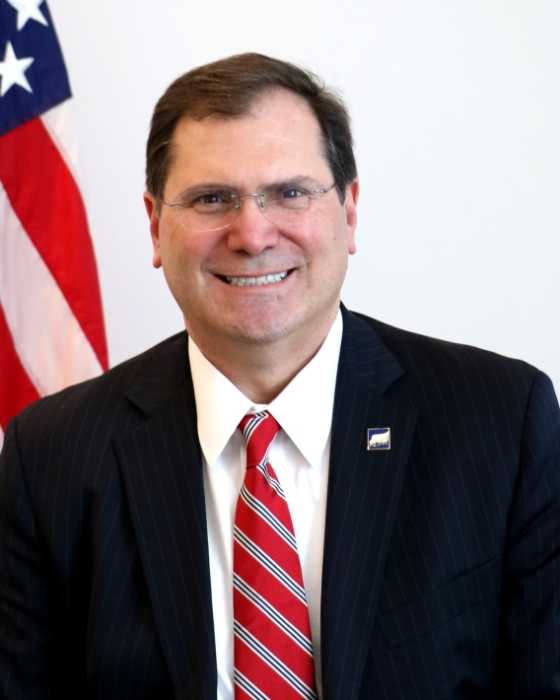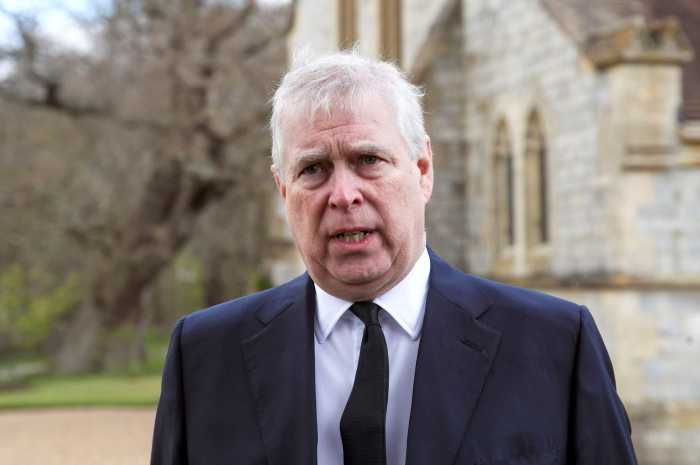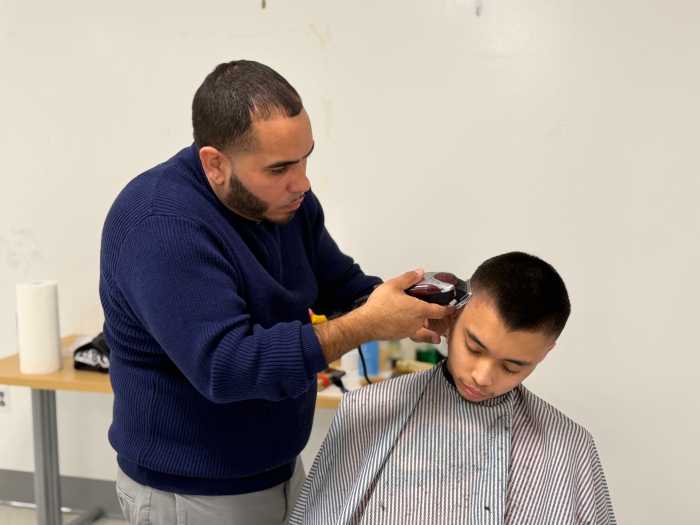As a nationally recognized expert in police and sentencing reform, St. John’s University Law School Dean Jelani Jefferson Exum might not seem like an obvious fit for a program known as a hub for bankruptcy, real estate and criminal prosecution.
The dean would disagree.
What she saw in the private Catholic university tucked away in a green patch of Eastern Queens was its bedrock commitment to the Vincentian mission of public service. In her second year as dean — and the 100th anniversary of the law program — Jefferson Exum has been making a push to expand the school’s social justice footprint.
Jefferson Exum, who grew up in a family of politicians and educators in New Orleans, made the move to New York City in 2024 from her previous position as dean at the University of Detroit Mercy School of Law.
“I very intentionally sought out a school with a commitment to social justice and community work, a school that had a healthy population of first-generation students and a school that was in a diverse area such that the kind of pipeline to the school would bring students from lots of backgrounds,” Jefferson Exum told amNY Law, “because then I knew that the work that I was doing to sort of get the school to its next level.
The multiculturalism of the school’s Queens location appeared to Jefferson Exum as a great opportunity. Hillcrest, its neighborhood, sits just north of the majority-Black Jamaica neighborhood, south of the predominantly Asian Flushing and east of the South Asian and Latino melting pot of Jackson Heights and Corona. A majority of the students come from the local area, with many of them commuting to the campus while living at home.
As part of the law school’s centennial, a record amount of funding has been raised, with the intention of using some of the money to grow its public service law center; and furthering its commitment to scholarships that help first-generation students coming locally from Queens and across the country access a legal career without mountains of debt.
“We have a real opportunity here… to have a transformational impact in generations through our students,” Jefferson Exum said. “So when we think about vision and what we’re poised to do, it’s really amping that up and thinking about what are ways that we can get meaningful scholarship dollars into our students’ hands.”
In its alumni, who include former Governor Mario Cuomo and former Court of Appeals Judge Joseph Bellacosa, there is a real affinity for St. John’s, Jefferson Exum said. “Part of this is because we do have that sort of first-generation ethos. And so a lot of them, their story is, ‘I am who I am, I am where I am because of St. John’s Law.’”
Tuition alone at St. John’s is $54,000 per year. With on-campus housing it can increase to over $80,000. The concerns over affordability have come in part through Jefferson Exum’s enthusiasm to meet and get to know students during her office hours. It’s not hard for her to relate to students, when she shares an eagerness to experience the city as a newcomer.
“I feel a real kinship with our students who are like, ‘I want to be in New York.’ And I can understand that, so that helps when I’m thinking about what it means to them to be here and to be aspiring to be a lawyer in New York,” she said, “because in in many ways I wanted to come here, to be in this kind of vibrant area with so many opportunities for me and for my children.”
She began her career as a legal researcher on the topic of sentencing with a focus on racial justice before her interest in questions about access to the legal profession got her involved in school administration.
She neatly described her approach in three themes: “excellence, prominence and impact.” She explained excellence as the drive to prepare students to be leaders in their fields; prominence as the goal of building off strong existing programs like bankruptcy and real estate; and impact as the way the school changes the lives of students.
Her focus on the newly renamed DiMartino/Smith Public Interest Center touches on several of these themes with a goal to broadly impact all students, not just those pursuing public interest careers, by teaching them to use their legal vocation for service.
The center has existed for 15 years and offers student clinics in domestic violence litigation, child advocacy and economic justice, among others. It has a substantial pool of alumni, but Jefferson Exum had been hearing a deep interest in developing this area of the law not just from students but from donors as well.
The school is not planning to require public service for all students but it does plan to expand the pro bono program within the public interest center (students are required by the state to complete pro bono hours as part of their law degree). The vision also includes funding for every student who wants to participate in spring break service travel or public interest work over the summer.
“We have a student demographic that is extremely interested in public interest law — even those who don’t plan to go into public interest law careers,” she said.
This interest among St. John’s student body speaks to why Jefferson Exum found the school’s ethos to be a good match. The opportunity to expand the public interest center spoke to her.
“That was huge. This is a place that’s a huge opportunity for growth and a big part of our vision is translating this Vincentian mission of service into real opportunities at our school.”
But Jefferson Exum acknowledged that in order to usher in first-generation law students to public interest fields that often don’t pay as well as the private sector, she has to make education more affordable.
Affordability, she said, is a huge challenge due to the changing landscape of federal loan availability for graduate students, which will require an increase in scholarships. As a private university, St. John’s runs on tuition dollars, so the way to offset those costs lies in philanthropy.
“We want to make sure that our students go on and are able to be successful and are able to leave the school without being burdened by crushing debt,” she said, adding that she’s found the way to interest donors is by “telling the story of the impact of the education that students receive here.”
She added that her focus is not solely on public interest. She’s also interested in increasing the number of graduates in big law as a means of economic upward mobility.
It was not Jefferson Exum’s career goal to end up in administration. When she started out researching sentencing reform after graduating from Harvard Law School, she was jumping from a host of teaching opportunities around the country, giving TEDx Talks and writing about her research in legal publications.
But she found her purpose when she was balancing employment opportunities and her mission of how to support a diverse new generation of lawyers
“I saw that as a real way to kind of give an open door to the next generation of lawyers who could really have an impact on how we behave as lawyers in society,” she said. “The short story there is that I learned more about the operations of law schools and really saw that I had a place in thinking about how to increase access for a diverse group of students, how to really lean into the school’s mission as well in ways that lined up with my own values.”
Jefferson Exum said that her desire to address racial and socioeconomic equity into school administration had deep roots in her upbringing. Her father, William Jefferson was an attorney by trade and a former member of Congress who represented greater New Orleans. Coming of age in a community of civil rights lawyers, she was brought up to understand the profession as a way of making a difference.
“It didn’t dawn on me until much later that it was a unique experience to be raised and living with people whose everyday lives were about systemic inequalities and what do we do about it. So to me that’s just like a natural part of who I am,” she said.
Jefferson Exum explained her mission of serving as a model for students, not just as a Black woman in leadership, but also in terms of campus discourse. She said she worries that this era’s political and social turmoil can lead to the fear of saying “what you think” and “chilling engagement with one another” on campus — a trend that’s only been aggravated by the omnipresence of social media.
It is her belief that the way to address the issue is through modeling best behavior in faculty discourse and allowing student groups to weigh in on difficult issues. The school recently hosted a faculty scholarship symposium, for instance, that brought together different areas of law, and faculty who often disagree with one another. She hopes that the diversity of legal thought will help students navigate their passions and interests without fear of judgment.
“…because this is a place of education and professional formation… it’s helping them to figure out, ‘Okay, as a budding legal professional, how do I want to posture myself in thinking about these difficult issues?,’” she said. “And this is the time and the space to do it safely.”







































